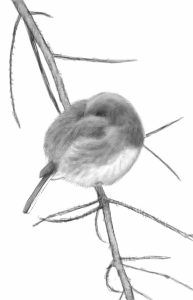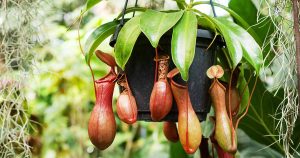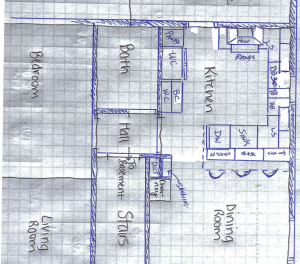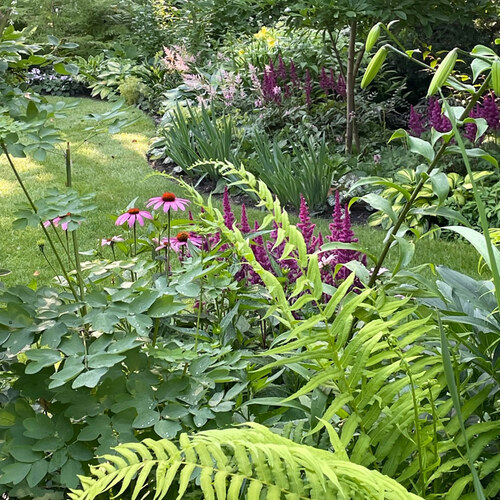
Hello GPODers!
Today we’re back in the garden of Susan Warde in St. Paul, Minnesota. Susan has shared various aspects of her gorgeous garden several times in the past (see some previous visits to Susan’s garden: Gardening at the 45th Parallel (Zone 4b), Rose Family Members in Susan’s Garden, Gardening Side by Side, The Summer That Was at the 45th Parallel), and today we get to see a specific update she made to her front yard design.
I like red and love orange, but five years ago I decided to limit the palatte in the front garden. Now the color scheme is limited to pink and yellow—not everyone’s cup of tea, I know. Pink with blue and purple are elegant and sophisticated, but pink and yellow is a combination that makes my heart sing. It’s not as dichromatic as it sounds. Pink includes rose, fuchsia, magenta, even maroon when the angelica comes into bloom, and the yellows encompass cream, lemon, gold, and melon, with the deeper colors appearing as the season progresses. And of course there’s white. After an early sea of scilla, blues and purples are limited to the back garden.
In early May cowslip (Primula veris, Zones 4–8) and barrenwort (Epimedium x rubrum, Zones 5–8) complement one another. The latter’s pink-edged leaves contribute to the color scheme.
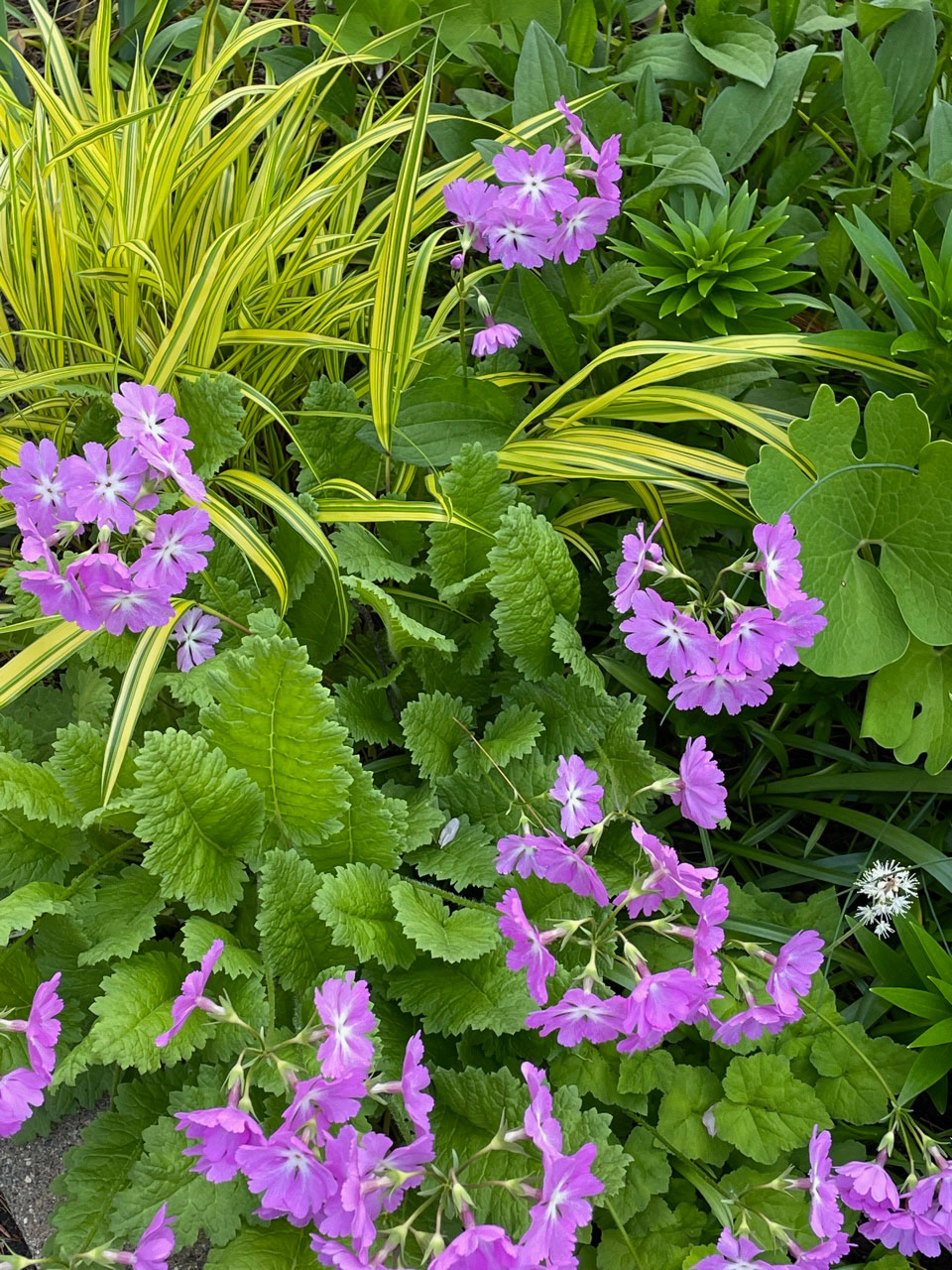 Lavender is permitted as long as it’s more pink than blue. In late May, this Japanese primula (Primula sieboldii, Zones 4–8) comes into bloom. It spreads like crazy, its clumps invading other plantings, and the leaves die back (unobtrusively, at least), but it’s so cheerful that I welcome it wherever it appears. The yellow leaves of hakone grass (Hakonechloa macra ‘Aureola’, Zones 5–9) contrast nicely, in form as well as color.
Lavender is permitted as long as it’s more pink than blue. In late May, this Japanese primula (Primula sieboldii, Zones 4–8) comes into bloom. It spreads like crazy, its clumps invading other plantings, and the leaves die back (unobtrusively, at least), but it’s so cheerful that I welcome it wherever it appears. The yellow leaves of hakone grass (Hakonechloa macra ‘Aureola’, Zones 5–9) contrast nicely, in form as well as color.
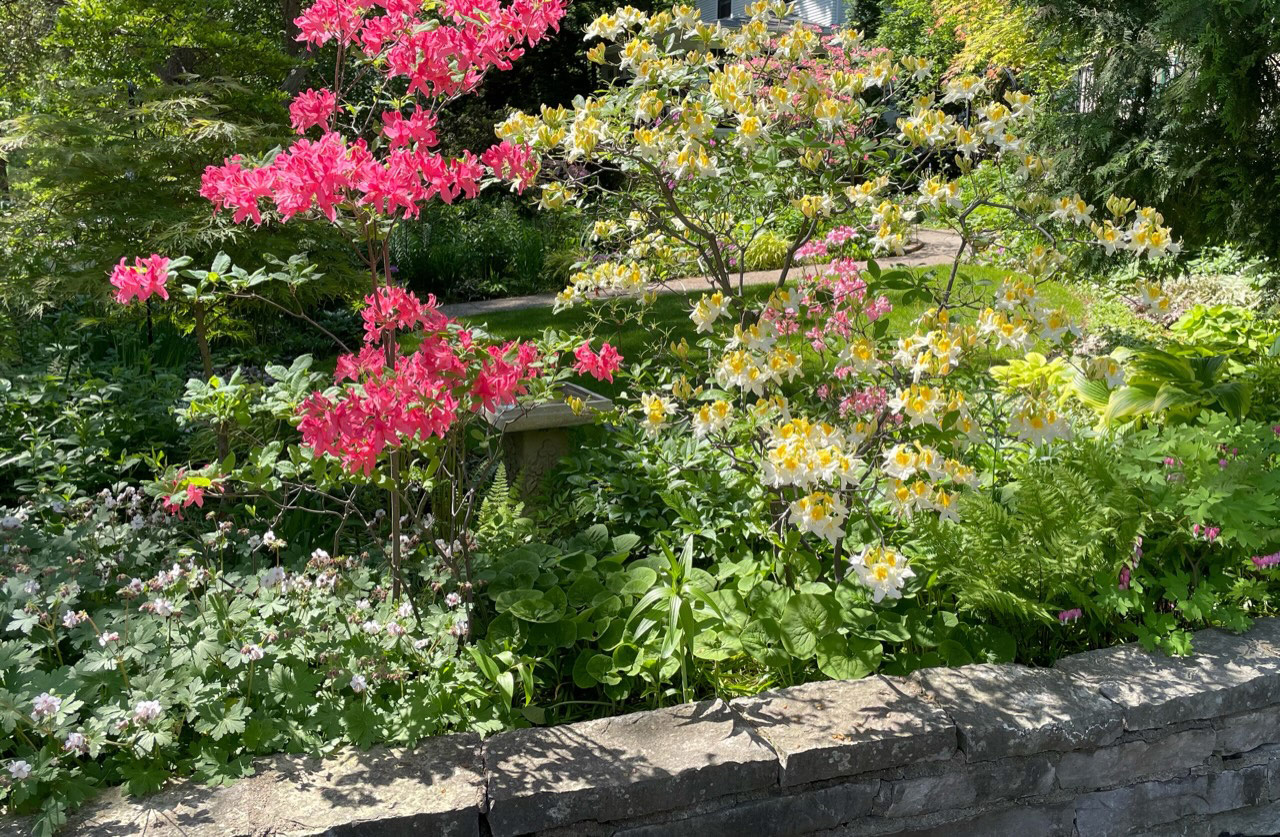 By the end of the month, the mollis azaleas (Rhododendron x kosteranum, Zones 5–8) are flowering. These belong to the Northern Lights series, hardy azaleas developed at the University of Minnesota. In the lower left is a pink-tinged geranium (also a spreader), and in the lower right a bleeding heart (Dicentra spectabilis, Zones 3–9) is peeking over the wall.
By the end of the month, the mollis azaleas (Rhododendron x kosteranum, Zones 5–8) are flowering. These belong to the Northern Lights series, hardy azaleas developed at the University of Minnesota. In the lower left is a pink-tinged geranium (also a spreader), and in the lower right a bleeding heart (Dicentra spectabilis, Zones 3–9) is peeking over the wall.
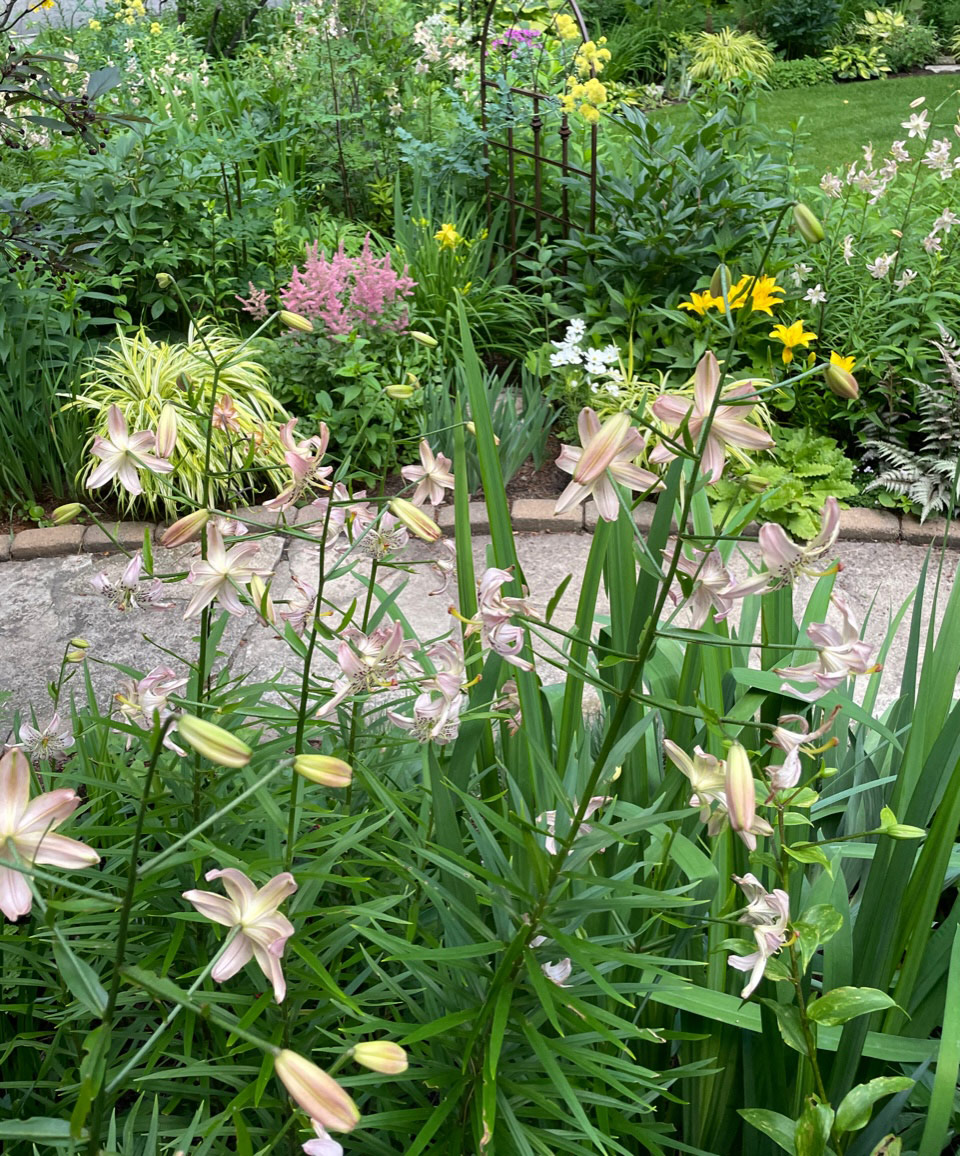 I love this view from the porch—pink and yellow everywhere! In the foreground is one of many clumps of ‘Corsage’ lily (Lilium ‘Corsage’, Zones 4–9), bountiful in June. I don’t know what the bright yellow Asiatic is; it was an unnamed gift from a friend. Also a mystery is the astilbe. The yellow puff (top left and center) is a meadow rue (Thalictrum flavum spp. glaucum, Zones 5–8). The yellow foliage of hakone grass and hostas brighten up the garden.
I love this view from the porch—pink and yellow everywhere! In the foreground is one of many clumps of ‘Corsage’ lily (Lilium ‘Corsage’, Zones 4–9), bountiful in June. I don’t know what the bright yellow Asiatic is; it was an unnamed gift from a friend. Also a mystery is the astilbe. The yellow puff (top left and center) is a meadow rue (Thalictrum flavum spp. glaucum, Zones 5–8). The yellow foliage of hakone grass and hostas brighten up the garden.
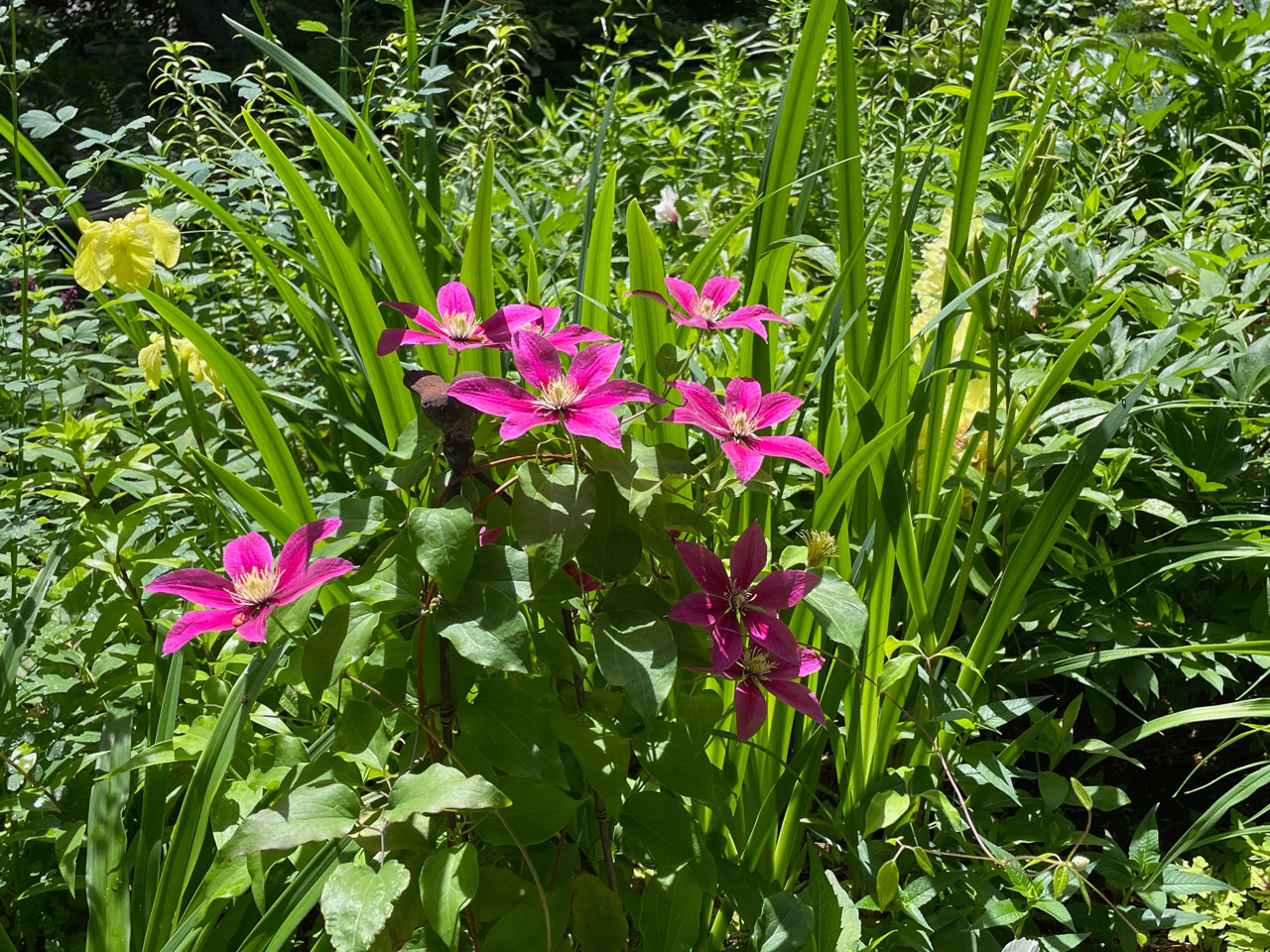 The fuchsia flowers of Boulevard® Acropolis™ clematis (Clematis ‘Evipo078’, Zones 4–10) take center stage here. The sword-shaped leaves behind belong to yellow flag (Iris pseudacorus and cvs., Zones 5–8). It’s great foliage that looks good all summer; it shimmies in the slightest breeze, looking as though it’s waving at passers-by. A couple of its yellow flowers are visible at the left, and at the right, partially hidden, are the yellow blooms of the Itoh peony ‘Bartzella’ (Paeonia ‘Bartzella’, Zones 4–9).
The fuchsia flowers of Boulevard® Acropolis™ clematis (Clematis ‘Evipo078’, Zones 4–10) take center stage here. The sword-shaped leaves behind belong to yellow flag (Iris pseudacorus and cvs., Zones 5–8). It’s great foliage that looks good all summer; it shimmies in the slightest breeze, looking as though it’s waving at passers-by. A couple of its yellow flowers are visible at the left, and at the right, partially hidden, are the yellow blooms of the Itoh peony ‘Bartzella’ (Paeonia ‘Bartzella’, Zones 4–9).
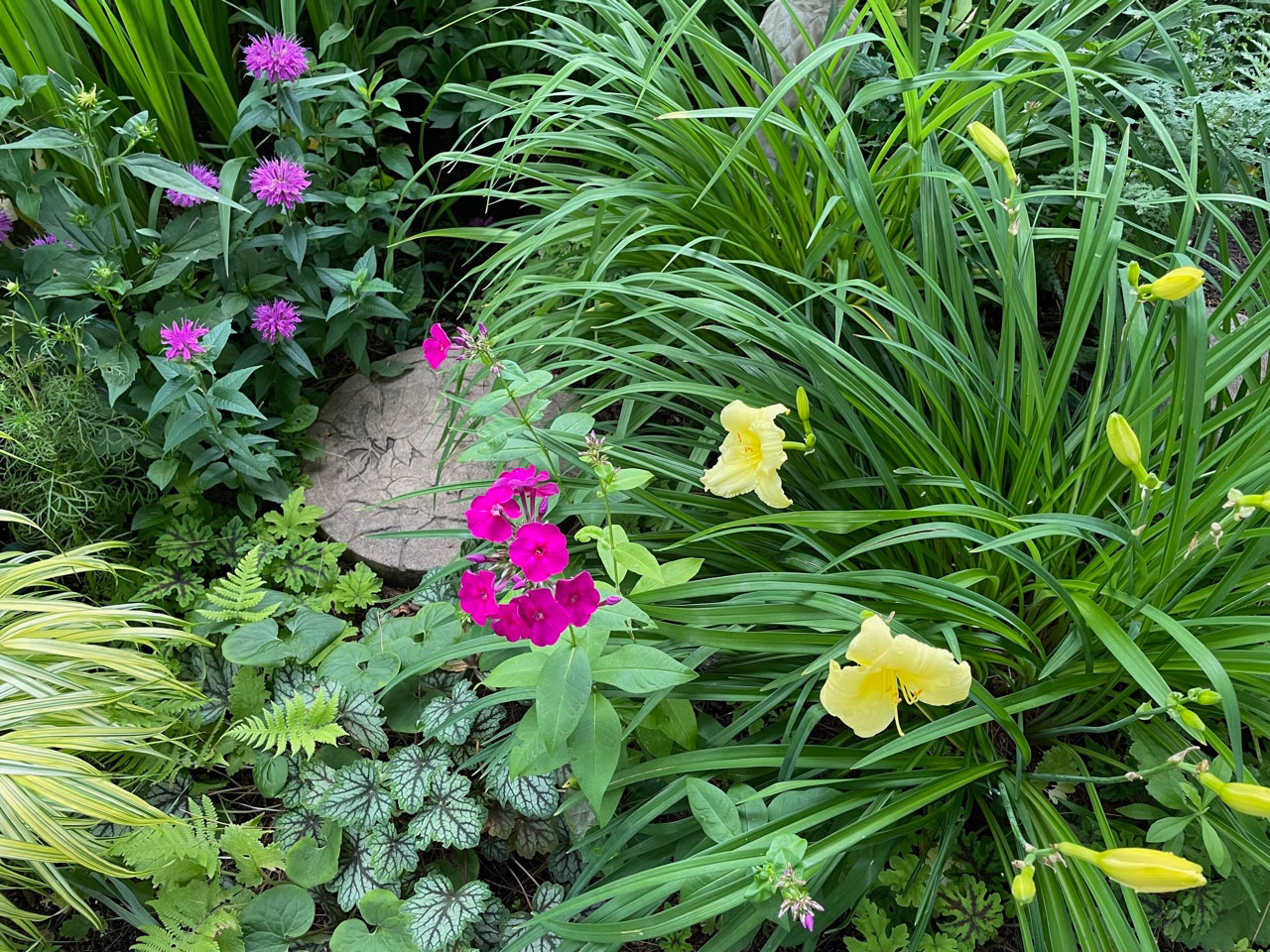 More hakone grass on the left. I don’t know the monarda (a gift from a fellow gardener). The daylily is ‘Stella Supreme’ (Hemerocallis ‘Stella Supreme’, Zones 3–9). One of the earliest phlox (Phlox paniculata, Zones 4–8) to flower in my garden is ‘Purple Flame’ (Phlox paniculata ‘Barfourteen’, Zones 4–8). I certainly wouldn’t call it purple, though most photos of it on the Internet are purple. I have about half a dozen of these, from different sources, and they are all this bright fuchsia. Some of the ground cover seen here includes foamflower (Tiarella cordifolia, Zones 3–8), coral bells (Heuchera ‘Green Spice’, Zones 4–9), wild ginger (Asarum canadense, Zones 2–8), and long beech fern (Phegopteris connectilis, Zones 2–7).
More hakone grass on the left. I don’t know the monarda (a gift from a fellow gardener). The daylily is ‘Stella Supreme’ (Hemerocallis ‘Stella Supreme’, Zones 3–9). One of the earliest phlox (Phlox paniculata, Zones 4–8) to flower in my garden is ‘Purple Flame’ (Phlox paniculata ‘Barfourteen’, Zones 4–8). I certainly wouldn’t call it purple, though most photos of it on the Internet are purple. I have about half a dozen of these, from different sources, and they are all this bright fuchsia. Some of the ground cover seen here includes foamflower (Tiarella cordifolia, Zones 3–8), coral bells (Heuchera ‘Green Spice’, Zones 4–9), wild ginger (Asarum canadense, Zones 2–8), and long beech fern (Phegopteris connectilis, Zones 2–7).
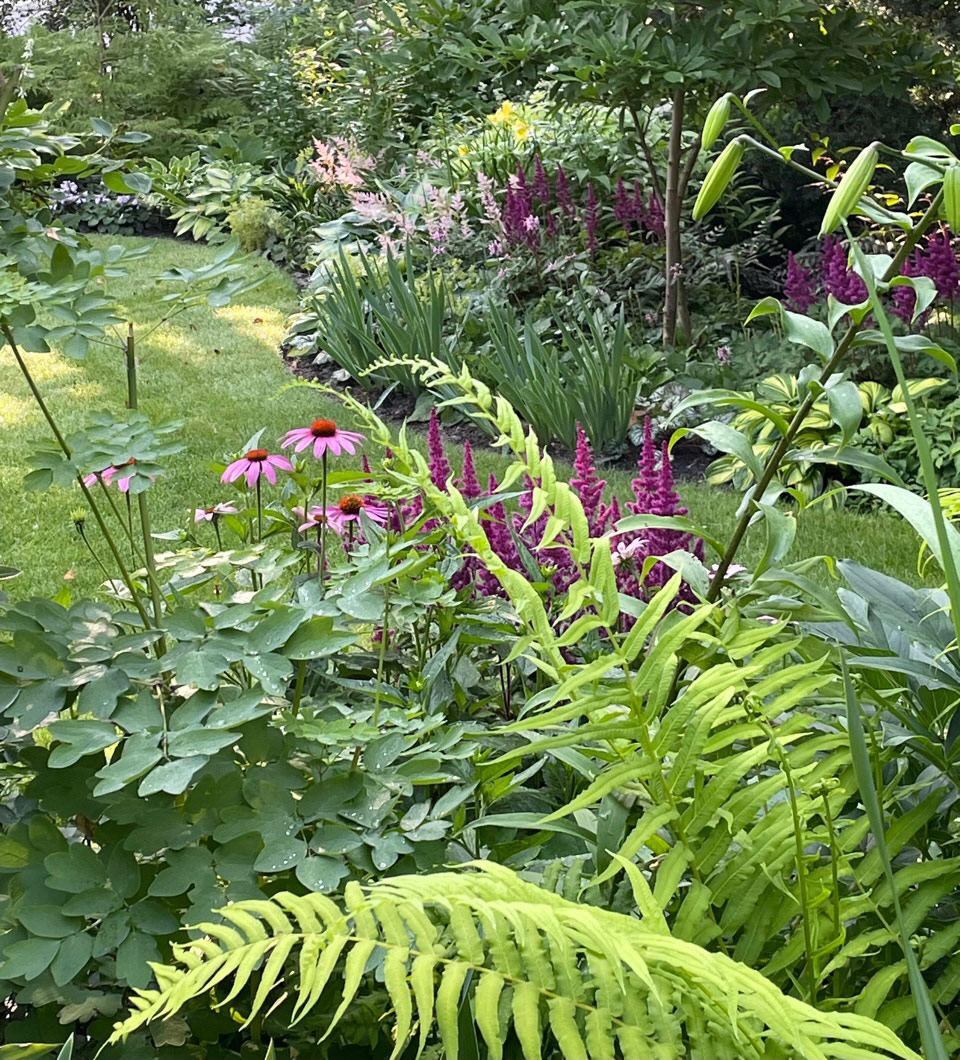 Another misleading cultivar name is astilbe ‘Vision in Red’ (Astilbe chinensis ‘Vision in Red’, Zones 3–8). The buds are indeed reddish, but in bloom it’s definitely magenta, much less red than some of the astilbes that I removed in the limiting-the-palatte process. They’re more a darker version of the pink coneflower (Echinacea purpurea, Zones 3–9) on the left. Unknown light pink astilbes and yellow daylilies can be seen in the background. The almost-chartreuse narrow-leaved spleenwort (Diplazium pycnocarpon, Zones 4–9) is one of my favorite ferns.
Another misleading cultivar name is astilbe ‘Vision in Red’ (Astilbe chinensis ‘Vision in Red’, Zones 3–8). The buds are indeed reddish, but in bloom it’s definitely magenta, much less red than some of the astilbes that I removed in the limiting-the-palatte process. They’re more a darker version of the pink coneflower (Echinacea purpurea, Zones 3–9) on the left. Unknown light pink astilbes and yellow daylilies can be seen in the background. The almost-chartreuse narrow-leaved spleenwort (Diplazium pycnocarpon, Zones 4–9) is one of my favorite ferns.
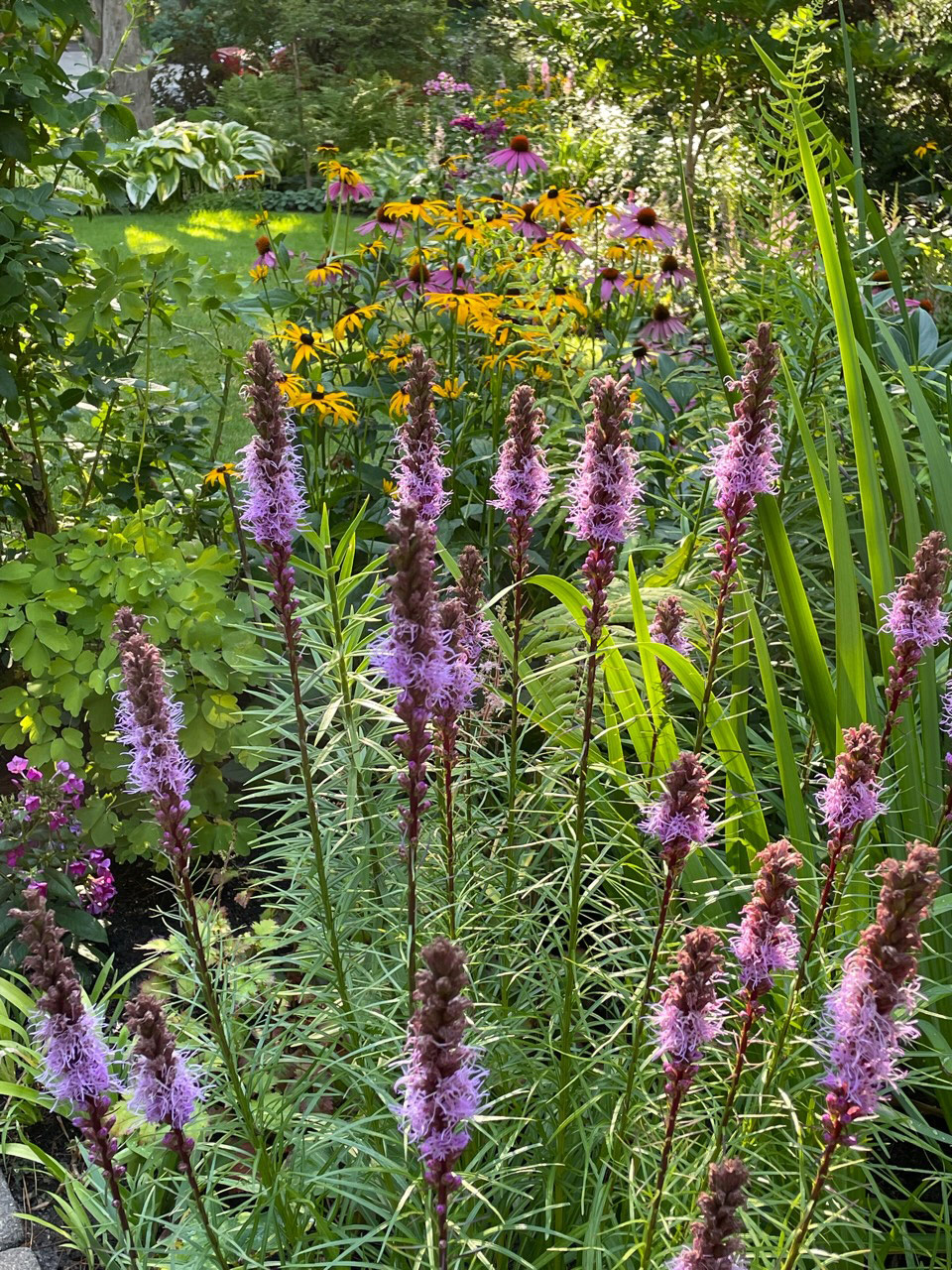 Early August. More coneflower and lots of black-eyed Susan (Rudbeckia fulgida ‘Goldsturm’, Zones 3–9), with the pinky-lavender flower spikes of blazing star (Liatrus spicata, Zones 3–9) in the foreground. The hosta in the upper left with the pale edges (more white than yellow because it gets a lot of afternoon sun) is ‘Montana Aureomarginata’ (Hosta ‘Montana Aureomarginata’, Zones 3–9).
Early August. More coneflower and lots of black-eyed Susan (Rudbeckia fulgida ‘Goldsturm’, Zones 3–9), with the pinky-lavender flower spikes of blazing star (Liatrus spicata, Zones 3–9) in the foreground. The hosta in the upper left with the pale edges (more white than yellow because it gets a lot of afternoon sun) is ‘Montana Aureomarginata’ (Hosta ‘Montana Aureomarginata’, Zones 3–9).
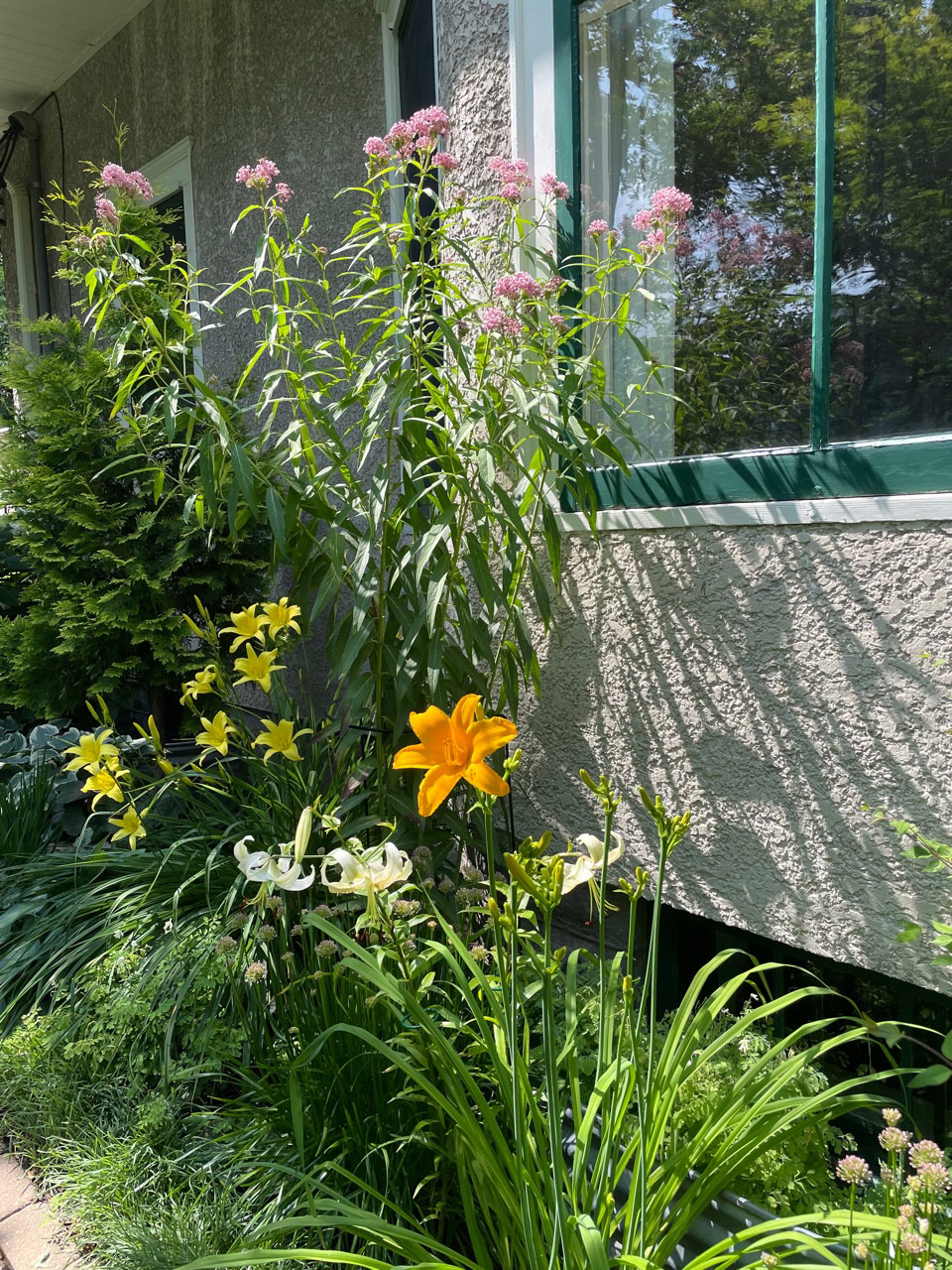 The tall plant is swamp milkweed (Asclepias incarnata, Zones 3–9), which was an impulse purchase last August. This summer it has topped six feet. I get to enjoy the swarms of pollinators from the path, and I also have a close-up (and safe) view of them from the dining room window. The yellow daylilies are ‘Hyperion’ (Hemerocallis ‘Hyperion’, Zones 2–8), and the melon-colored one is ‘Autumn Gold’ (Hemerocallis ‘Olallie Autumn Gold’, Zones 3–8), the first daylily I ever got (also a gift from a friend). Shown here is its first bloom of the season (July 24); it will go on to produce dozens of them, which look beautiful with the pinky-lavendar blooms of allium ‘Millenium’ (Allium ‘Millenium’, Zones 4–8), just starting to show some color. The lilies are ‘Silver Scheherazade’ (Lilium ‘Silver Scheherazade’, Zones 5–8), somewhat stunted after being transplanted. Can you spot the white corydalis (Corydalis ochroleuca, Zones 5–8) that seeded into the window well? The best view of it is from the basement.
The tall plant is swamp milkweed (Asclepias incarnata, Zones 3–9), which was an impulse purchase last August. This summer it has topped six feet. I get to enjoy the swarms of pollinators from the path, and I also have a close-up (and safe) view of them from the dining room window. The yellow daylilies are ‘Hyperion’ (Hemerocallis ‘Hyperion’, Zones 2–8), and the melon-colored one is ‘Autumn Gold’ (Hemerocallis ‘Olallie Autumn Gold’, Zones 3–8), the first daylily I ever got (also a gift from a friend). Shown here is its first bloom of the season (July 24); it will go on to produce dozens of them, which look beautiful with the pinky-lavendar blooms of allium ‘Millenium’ (Allium ‘Millenium’, Zones 4–8), just starting to show some color. The lilies are ‘Silver Scheherazade’ (Lilium ‘Silver Scheherazade’, Zones 5–8), somewhat stunted after being transplanted. Can you spot the white corydalis (Corydalis ochroleuca, Zones 5–8) that seeded into the window well? The best view of it is from the basement.
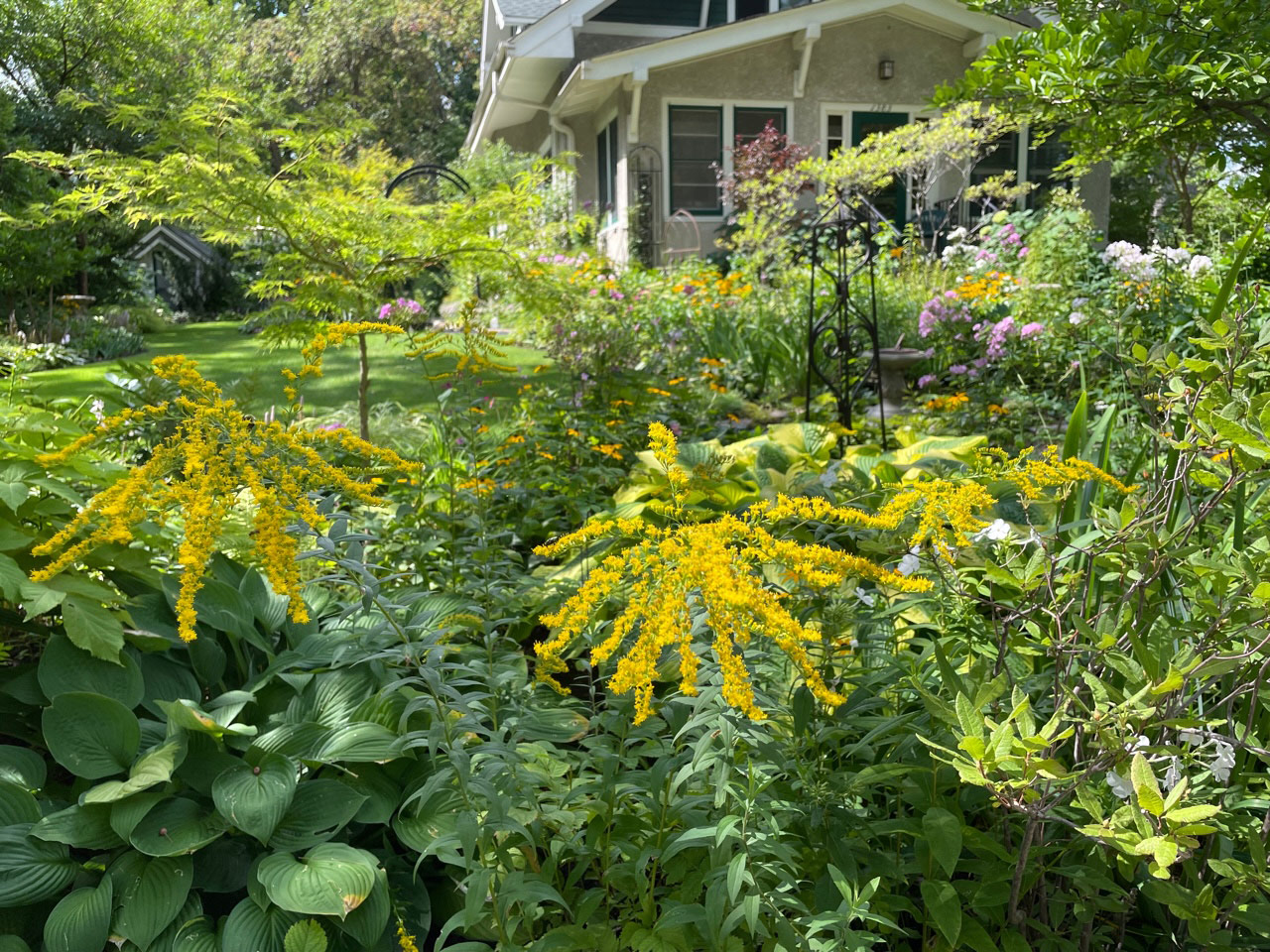 A general view of the front garden in late August. Volunteer goldenrod (Solidago sp., Zones 3–9) is in the foreground. Still showy are lots of black-eyed Susan and phlox. The small tree with maroon leaves just in front of the porch is a crabapple (Malus ‘Purple Raindrops’, Zones 4–8). Purple? The flowers are bright pink and the fruits are cranberry!
A general view of the front garden in late August. Volunteer goldenrod (Solidago sp., Zones 3–9) is in the foreground. Still showy are lots of black-eyed Susan and phlox. The small tree with maroon leaves just in front of the porch is a crabapple (Malus ‘Purple Raindrops’, Zones 4–8). Purple? The flowers are bright pink and the fruits are cranberry!
Thank you for yet another beautiful and insightful tour through your gardens, Susan! Pink and yellow have always been colors I’ve been drawn to, but I think I’ve found a whole new appreciation.
Have a garden you’d like to share?
Have photos to share? We’d love to see your garden, a particular collection of plants you love, or a wonderful garden you had the chance to visit!
To submit, send 5-10 photos to [email protected] along with some information about the plants in the pictures and where you took the photos. We’d love to hear where you are located, how long you’ve been gardening, successes you are proud of, failures you learned from, hopes for the future, favorite plants, or funny stories from your garden.
Have a mobile phone? Tag your photos on Facebook, Instagram or Twitter with #FineGardening!
Do you receive the GPOD by email yet? Sign up here.
Fine Gardening Recommended Products

Scotts Cordless Grass-Shear/Shrub-Trimmer Combo
With a built-in 7.2-volt lithium-ion battery, this little guy weighs less than 2 lb. and can zip through all your minor pruning tasks quickly and easily.
– 13.5 x 3 x 5 inches
– Uses a 7.2-Volt 2Ah high-capacity built-in lithium-ion battery; Includes a fast charger

Gilmour 811673-1001 Sprinkler
– 43-ft. spray distance (up to 5, 800 sq. ft. coverage)
– Adjustable collar for partial- to full-circle coverage
– Dial precisely sets spray distance
– On/off switch eliminates trips from sprinkler to spigot

Rain Bird PATIOKIT Drip Irrigation Patio Watering Kit
– Complete 42-piece drip irrigation kit eliminates watering by hand
– Provides drip irrigation for up to 6 planters
– Easy to assemble: just attach to faucet, cut tubing and connect watering devices
– Attaches easily to your outdoor faucet or hose
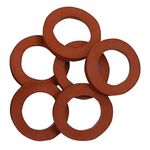
Gilmore Rubber Hose Washer 10pk
– Live red rubber construction, 3/4in. washers
– Clip of 10

Dramm Revolution Adjustable 9-Pattern Metal Hose Nozzle
– 15 x 10 x 7 inches
– Ergonomic insulated grip
– Maximum pressure of 90 PSI
– Fully adjustable spray pattern
– No trigger lock
